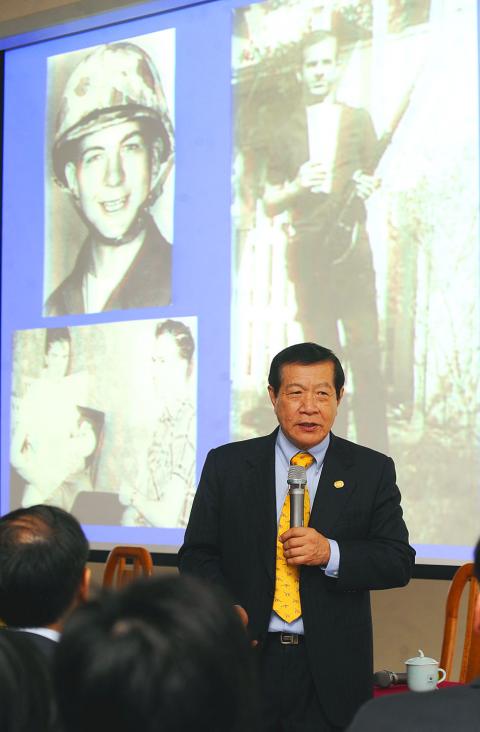Forensic scientist Henry Lee (李昌鈺) will join the team of investigators looking into the circumstances surrounding the shooting of Sean Lien (連勝文) on the eve of the special municipality elections late last month.
The US-based Lee, who was in Taiwan yesterday to attend the establishment of the “Henry Lee Forensic Science Lecture Workshop” at National Taiwan University of Science and Technology, told reporters he had discussed Lien’s case with the Criminal Investigation Bureau, especially regarding the German-made pistol believed to have been used in the shooting.
Lee said he would look at the forensics and material evidence, but would not involve himself in the criminal and political aspects of the case.

PHOTO: WANG MIN-WEI, TAIPEI TIMES
“I only want to do forensic work on this case; other investigation activities relating to the case are of no interest to me,” he said. “Criminal investigations should not be mixed with forensic work.”
It would not be the first time Lee has assisted investigators in high-profile criminal cases. He helped forensics experts in their probe of the March 2004 election-eve assassination attempt on former president Chen Shui-bian (陳水扁) and vice president Annette Lu (呂秀蓮).
Judicial authorities have been under pressure to resolve the Lien case, in which Huang Yun-sheng (黃運聖), a 29-year-old bystander, was killed.
Suspected gunman Lin Cheng-wei (林正偉), who also goes by the name Ma Mien (馬面), has reportedly told investigators that he shot Lien, a son of former vice president Lien Chan (連戰), by mistake, saying that he had wanted to shoot a local Chinese Nationalist Party (KMT) politician, Taipei County Deputy Speaker Chen Hung-yuan (陳鴻源), because of a land dispute involving Chen Hung-yuan’s family.
Lin’s claim was supported by the results of two polygraph sessions.
Sean Lien, who was shot in the face and was hospitalized for nine days, says the shooter was targeting him and not Chen Hung-yuan.
The incident gave rise to speculation that it was staged by KMT politicians, coming as it did just hours before the Nov. 27 elections.
Commenting on Sean Lien’s rapid recovery, Lee said it was possible for a person to recover quickly from non-fatal gunshot wounds and that a quick recovery did not necessarily mean that the shooting had been orchestrated.
A person can recover quite quickly from a shooting that does not damage major organs or tissue, he said.
The bullet entered Sean Lien’s left cheek and exited near his right temple. On his first public appearance after his discharge from hospital, Sean Lien had bandages on both sides of his face, wore a surgical mask and had a bloodshot eye. Reports that he was smiling and could eat bread days after the incident gave rise to speculation that the shooting may have been staged, or the severity of his wounds overplayed.
KMT Legislator Hsieh Kuo--liang (謝國樑), a close friend of Sean Lien, said he welcomed Lee’s participation in the investigation.
ADDITIONAL REPORTING BY FLORA WANG, STAFF REPORTER AND CNA

US President Donald Trump yesterday announced sweeping "reciprocal tariffs" on US trading partners, including a 32 percent tax on goods from Taiwan that is set to take effect on Wednesday. At a Rose Garden event, Trump declared a 10 percent baseline tax on imports from all countries, with the White House saying it would take effect on Saturday. Countries with larger trade surpluses with the US would face higher duties beginning on Wednesday, including Taiwan (32 percent), China (34 percent), Japan (24 percent), South Korea (25 percent), Vietnam (46 percent) and Thailand (36 percent). Canada and Mexico, the two largest US trading

AIR SUPPORT: The Ministry of National Defense thanked the US for the delivery, adding that it was an indicator of the White House’s commitment to the Taiwan Relations Act Deputy Minister of National Defense Po Horng-huei (柏鴻輝) and Representative to the US Alexander Yui on Friday attended a delivery ceremony for the first of Taiwan’s long-awaited 66 F-16C/D Block 70 jets at a Lockheed Martin Corp factory in Greenville, South Carolina. “We are so proud to be the global home of the F-16 and to support Taiwan’s air defense capabilities,” US Representative William Timmons wrote on X, alongside a photograph of Taiwanese and US officials at the event. The F-16C/D Block 70 jets Taiwan ordered have the same capabilities as aircraft that had been upgraded to F-16Vs. The batch of Lockheed Martin

GRIDLOCK: The National Fire Agency’s Special Search and Rescue team is on standby to travel to the countries to help out with the rescue effort A powerful earthquake rocked Myanmar and neighboring Thailand yesterday, killing at least three people in Bangkok and burying dozens when a high-rise building under construction collapsed. Footage shared on social media from Myanmar’s second-largest city showed widespread destruction, raising fears that many were trapped under the rubble or killed. The magnitude 7.7 earthquake, with an epicenter near Mandalay in Myanmar, struck at midday and was followed by a strong magnitude 6.4 aftershock. The extent of death, injury and destruction — especially in Myanmar, which is embroiled in a civil war and where information is tightly controlled at the best of times —

China's military today said it began joint army, navy and rocket force exercises around Taiwan to "serve as a stern warning and powerful deterrent against Taiwanese independence," calling President William Lai (賴清德) a "parasite." The exercises come after Lai called Beijing a "foreign hostile force" last month. More than 10 Chinese military ships approached close to Taiwan's 24 nautical mile (44.4km) contiguous zone this morning and Taiwan sent its own warships to respond, two senior Taiwanese officials said. Taiwan has not yet detected any live fire by the Chinese military so far, one of the officials said. The drills took place after US Secretary